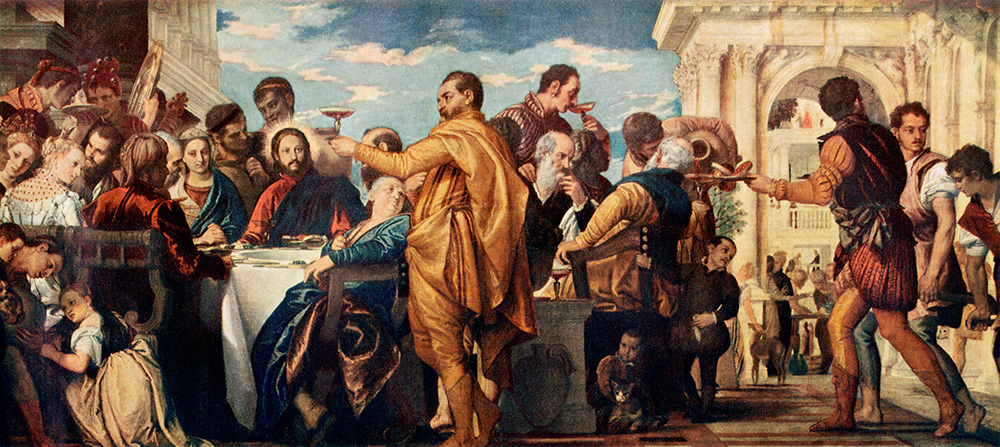Dost thou believe?
(The Saviour of the World, Vol I, Book III, Poem V)

We linger fondly o’er that gracious feast
Venetian painter portrays,—how gay guests
Hold breath, amazed, at wonder had been wrought!
So would we have it for our Master’s praise!
But pomp and circumstance attend not signs
That witness Christ; not wonders these, nor portents,
But signs to challenge who had eyes to see.
Sign, leading thought to that thing signified,
The glory of Christ, was wrought in Galilee,
No man perceiving, only the disciples;
And they, at the first sign He gave, believed;
They saw His glory manifest that day!
Who but Messias would such bounties pour?
Who else could subvert Nature’s usual ways?
Not proof that Christ wrought with us all those signs,
(For confirmation of an earlier faith),
But proof of fitness, challenge on the threshold,
To him would tread the Christian’s difficult way:
Behold, a mystery! “Canst thou believe
That water, at the word of Christ was wine?”
“Nay, but,” thou sayest, “I know that Christ was good—
There is none other by whom men are saved;
But why these miracles, magician’s wonders,
Unworthy Him in whose hand are our souls?”
“Dost thou believe that Christ wrought many signs,
Made dumb to speak, the blind receive their sight,
The lame to leap, and for the poor poured forth
The treasures of His wisdom?”
“I believe!”
To-day must catechumen sure respond:
Else what is left? A holy man of God,
The great exemplar of our halting lives?
Aye, but how follow? Birds show how to cleave
The air with rapid wing, but can we so?
“But Christ doth more,” you say; “He is the Way
He shows; we walk in Him; and when we fall,
We cry on Him for help, and go secure!”
Why, here a miracle, more potent, subtle,
Than water turned to wine, or sudden lull
Of that tempestuous sea! “Whether is easier,”
Saith Christ, “to say, Thy sins forgiven thee,
Or say, Arise and walk?” Lo, here the test
For measuring miracles! The easier sign,
Arresting ‘Nature’s Law,’ we stumble at,
Yet pray, “Give us this day our daily bread!”
“Forgive our debts as we forgive our debtors!”
O fools and slow of heart! The harder thing
We glibly take on trust: but ‘Natural Law’
Must needs, we say, proceed in its due course!
Blind that we are, what meaning have our words?
We note a process, and we call it Law;
Yet not one law that guides the universe—
The law by which a leaf takes shape, a worm
Erects those spades of his to dig his way,—
Not the least law by which the worlds consist
Is manifest to men; all’s mystery!
Only in Christ no mystery we allow,—
He shall nor do nor be more than man can,
Else we will none of Him!
Yet there be tests
Whereby to try each several miracle,
Is it indeed of Christ? Not baby play
Of measuring ocean with a spoon to say,
Water, how much; nor meting out His works
By our infantine lore of natural law:
But, Doth each sign we read of show His glory?—
Not pomp of power, splendour of attribute,—
His glory is His goodness! Let but show
For man such value as counts nought of things—
Simplicity and courtesy and kindness,
Fitness for the occasion, apt response
To need that claimed the act,—by these we know
Whether here be of Christ a very sign!
As naturalist from some small bone constructs
In his thought the mighty mammoth, so each sign
Whereby Christ manifests Himself implies
The whole, and we behold His glory, full
Of grace and truth!
“Our Master, give us grace to read Thy sign,
Nor stumble o’er that water turned to wine,
Which, on the threshold of that door Thou art,
Obstructs; lest we too lightly choose our part,
And when temptation cometh fall away,
Nor garner any fruit on harvest day!”
An old man, having slept an hundred years,
Wakes up; what age of miracle appears
The world to have overta’en! By magic art,
Each speaks to each, a thousand leagues apart!
Nay, tones are caught and kept a thousand years,
And men long dead shall speak as to their peers!
Should he go sleep another century,
In miracle, for him, no mystery!
So had the world advanced to understand
How slight a thing ’tis matter to command,
Compared with that high mastery of their mind,
Compels, perforce, th’ allegiance of mankind!